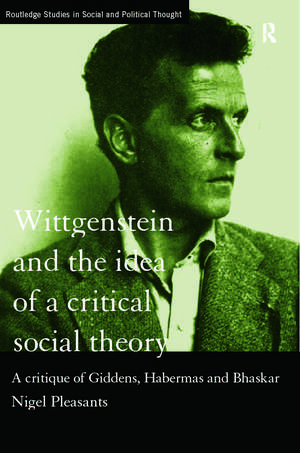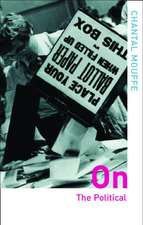Wittgenstein and the Idea of a Critical Social Theory: A Critique of Giddens, Habermas and Bhaskar: Routledge Studies in Social and Political Thought
Autor Nigel Pleasantsen Limba Engleză Paperback – 8 apr 2014
| Toate formatele și edițiile | Preț | Express |
|---|---|---|
| Paperback (1) | 411.42 lei 43-57 zile | |
| Taylor & Francis – 8 apr 2014 | 411.42 lei 43-57 zile | |
| Hardback (1) | 1001.07 lei 43-57 zile | |
| Taylor & Francis – 29 iul 1999 | 1001.07 lei 43-57 zile |
Din seria Routledge Studies in Social and Political Thought
-
 Preț: 152.42 lei
Preț: 152.42 lei -
 Preț: 296.64 lei
Preț: 296.64 lei -
 Preț: 380.89 lei
Preț: 380.89 lei -
 Preț: 310.96 lei
Preț: 310.96 lei -
 Preț: 287.67 lei
Preț: 287.67 lei -
 Preț: 340.32 lei
Preț: 340.32 lei -
 Preț: 303.87 lei
Preț: 303.87 lei -
 Preț: 325.72 lei
Preț: 325.72 lei -
 Preț: 309.82 lei
Preț: 309.82 lei -
 Preț: 324.20 lei
Preț: 324.20 lei -
 Preț: 221.84 lei
Preț: 221.84 lei -
 Preț: 310.41 lei
Preț: 310.41 lei -
 Preț: 311.41 lei
Preț: 311.41 lei -
 Preț: 311.70 lei
Preț: 311.70 lei -
 Preț: 311.48 lei
Preț: 311.48 lei -
 Preț: 311.41 lei
Preț: 311.41 lei -
 Preț: 340.26 lei
Preț: 340.26 lei -
 Preț: 216.44 lei
Preț: 216.44 lei -
 Preț: 279.47 lei
Preț: 279.47 lei -
 Preț: 339.64 lei
Preț: 339.64 lei -
 Preț: 387.02 lei
Preț: 387.02 lei - 18%
 Preț: 1113.25 lei
Preț: 1113.25 lei - 18%
 Preț: 1055.51 lei
Preț: 1055.51 lei - 18%
 Preț: 1058.43 lei
Preț: 1058.43 lei - 18%
 Preț: 1005.73 lei
Preț: 1005.73 lei - 25%
 Preț: 544.67 lei
Preț: 544.67 lei -
 Preț: 409.73 lei
Preț: 409.73 lei - 18%
 Preț: 1061.22 lei
Preț: 1061.22 lei - 18%
 Preț: 1061.81 lei
Preț: 1061.81 lei - 18%
 Preț: 1215.71 lei
Preț: 1215.71 lei - 18%
 Preț: 998.71 lei
Preț: 998.71 lei - 18%
 Preț: 1109.99 lei
Preț: 1109.99 lei -
 Preț: 488.71 lei
Preț: 488.71 lei - 26%
 Preț: 847.73 lei
Preț: 847.73 lei -
 Preț: 416.12 lei
Preț: 416.12 lei - 18%
 Preț: 1054.75 lei
Preț: 1054.75 lei - 25%
 Preț: 769.72 lei
Preț: 769.72 lei - 18%
 Preț: 1059.84 lei
Preț: 1059.84 lei -
 Preț: 489.99 lei
Preț: 489.99 lei - 18%
 Preț: 1062.31 lei
Preț: 1062.31 lei - 18%
 Preț: 1108.37 lei
Preț: 1108.37 lei -
 Preț: 382.65 lei
Preț: 382.65 lei - 42%
 Preț: 181.06 lei
Preț: 181.06 lei - 26%
 Preț: 822.36 lei
Preț: 822.36 lei - 18%
 Preț: 1219.38 lei
Preț: 1219.38 lei
Preț: 411.42 lei
Nou
Puncte Express: 617
Preț estimativ în valută:
78.73€ • 81.73$ • 65.65£
78.73€ • 81.73$ • 65.65£
Carte tipărită la comandă
Livrare economică 24 martie-07 aprilie
Preluare comenzi: 021 569.72.76
Specificații
ISBN-13: 9780415757584
ISBN-10: 0415757584
Pagini: 224
Dimensiuni: 156 x 234 x 18 mm
Greutate: 0.34 kg
Ediția:1
Editura: Taylor & Francis
Colecția Routledge
Seria Routledge Studies in Social and Political Thought
Locul publicării:Oxford, United Kingdom
ISBN-10: 0415757584
Pagini: 224
Dimensiuni: 156 x 234 x 18 mm
Greutate: 0.34 kg
Ediția:1
Editura: Taylor & Francis
Colecția Routledge
Seria Routledge Studies in Social and Political Thought
Locul publicării:Oxford, United Kingdom
Cuprins
Chapter 1 Wittgenstein and Critical Social Theory; Chapter 2 Does Wittgenstein Mean What he Says?; Chapter 3 Winch, Wittgenstein and Critical Social Theory; Chapter 4 Wittgenstein’s Rule-Following Remarks and Critical Social Theory; Chapter 5 Hayek’s and Giddens’s Epistemological Argument Against Socialism; Chapter 6 ‘Free to Act Otherwise’?; Chapter 7 Milgram Versus Garfinkel; Chapter 8 Habermas and The Idea of a Critical Social Theory; Chapter 9 Conclusion;
Notă biografică
Nigel Pleaants Lecturer in Sociology at the University of Exeter.
Descriere
This book uses the philosophy of Wittgenstein as a perspective from which to challenge the idea of a critical social theory, represented pre-eminently by Giddens, Habermas and Bhaskar.










